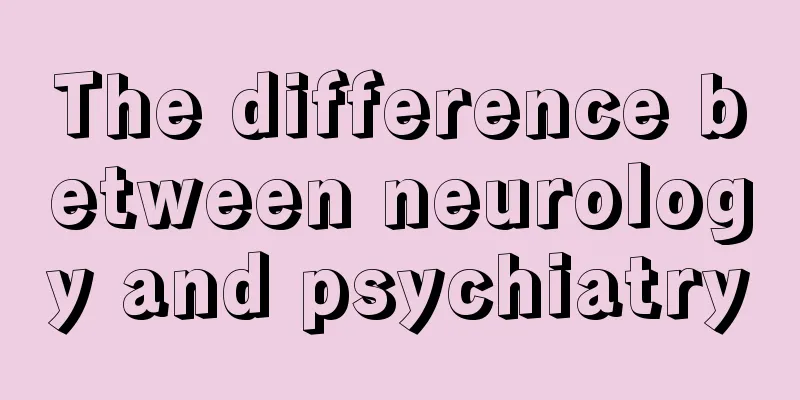The difference between neurology and psychiatry

|
In daily life, when people can't stand someone being angry, they will say that this person is mentally ill or neurotic, meaning that this person has mental problems and is different from normal people. In fact, many people cannot tell the difference between neurology and psychiatry. They feel they are the same thing, both meaning that a person is not mentally well. The following is an introduction to the differences between psychiatry and neurology. If you want to know more, you can read it and stop making a fool of yourself. 1. What is the difference between neurology and psychiatry? In life, the word "neurotic" is generally used to describe people with strange ideas and bizarre behaviors, especially when joking. This has directly led to people's misunderstanding of neurosis. Most people confuse "neurosis" with "mental illness" and think that neurology and psychiatry are the same thing. In fact, what people call "neurosis" refers to mental illness. 2. So, what diseases does the neurology department treat? As the name suggests, "neuropathy" refers to diseases of the nervous system. Certain parts of the nervous system are attacked by inflammation, vascular disease, poisoning, trauma, tumors, and degeneration, causing damage and disease, leading to symptoms such as dizziness, headache, limb weakness, numbness, pain, paralysis, convulsions, and coma. We call this type of disease neuropathy. These lesions can occur in the central nervous system (brain and spinal cord), peripheral nerves, and muscles. It can also be neuromuscular damage caused by medical diseases such as diabetes, kidney disease, etc. Common neurological diseases include: (1) Cerebrovascular diseases: stroke (cerebral infarction, cerebral hemorrhage, etc.), cerebral ischemia, cerebral arteriosclerosis, etc.; common symptoms include dizziness, headache, hemiplegia (hemiplegia), numbness, crooked mouth, slurred speech, aphasia, unsteady walking, confusion, incontinence, etc. (2) Infectious diseases: encephalitis, meningitis; common symptoms include fever, headache, vomiting, convulsions, mental abnormalities, etc. (3) Epilepsy; commonly known as "epilepsy", sudden fall, unconsciousness, and convulsions. (4) Peripheral neuropathy: multiple neuropathy, facial neuritis (facial paralysis), sciatica, trigeminal neuralgia. Common symptoms of this type of disease include: limb numbness, weakness, limited movement, cramping, facial paralysis, etc. (5) Extrapyramidal diseases: Parkinson's disease (Parkinson-Shaker Paralysis), Chorea, etc. Common symptoms include: involuntary shaking of hands and feet, limb stiffness, inflexible movements, involuntary movements of limbs or face; (6) Degenerative diseases: Alzheimer's disease (senile dementia), motor neuron disease, etc. Common symptoms include: dementia, limb movement disorders, etc. (7) Muscle diseases: polymyositis, myasthenia gravis, periodic paralysis, muscular dystrophy, etc. Common symptoms include: muscle weakness, atrophy, drooping eyelids, difficulty opening eyes, muscle weakness after activity, etc. (8) Spinal cord disease: acute myelitis, spinal cord compression, etc. Common symptoms include paraplegia or quadriplegia, and urinary and bowel disorders. (9) Neuropsychological diseases: such as "neurosis", common names include "neurosis" and "neurasthenia". Such patients are increasingly common in neurology clinics. Common symptoms include dizziness, headache, heaviness of the head, feeling confused, poor sleep, depression, excessive thinking, palpitations, chest tightness, anxiety, irritability, fatigue, lack of energy, decreased work efficiency, memory loss, and frequent pain. They are characterized by diverse symptoms, a long course of illness, and the inability of various examinations to find specific lesions. 3. Psychiatry Many people do not understand psychiatry and even have prejudices and discrimination against it. In fact, there are some mentally unhealthy people or unhealthy words and deeds around us. If we do not pay attention to it, the problem will become more and more serious, and finally lead to loss of social function and affect work and life. If you have the following words or deeds, please see a psychiatrist as soon as possible to seek early identification and diagnosis. Early handling or treatment is crucial to prognosis. Do not delay treatment for the sake of face or a fluke mentality, which will cause unnecessary serious consequences. 1. Become withdrawn and taciturn, unwilling to interact with others. 2. They often wander around aimlessly, behave in ways that others cannot understand, and are even shameless. 3. Hurt yourself, others, or destroy things for no reason. 4. He moved very slowly, doing everything very slowly, even lying in bed all day without moving or saying a word. 5. He is nosy, busy all day long and spends money recklessly. 6. Lose temper for no reason and without regard for anything. 7. He cries and laughs at random, or laughs alone, or makes strange faces. 8. Excited, talkative, talking nonstop, bragging about how smart he is. 9. Feeling depressed, often crying alone, or feeling disgusted with the world and wanting to die, or feeling anxious and restless. 10. He speaks little, is cold, doesn't care about anything, and has no affection for his family members. 11. Talking nonsense, or talking to oneself, or saying things that others cannot understand. 12. Believing that your brain is not under your control. 13. He is suspicious and believes without basis that others are harming and controlling him. 14. To boast in an extremely unrealistic way about one's extraordinary talent and power. 15. Spread rumors that someone else is pursuing him, or suspect that his lover has a lover. 16. Hear voices that others cannot hear, or hear nonsense that someone is talking about him. 17. Seeing or smelling things or odors that are not there, tasting strange smells or poison in water or food, etc. 18. The ability to live and work is significantly reduced, or the person becomes sluggish and stupid. 19. They have very poor memory, and can't even remember their children's ages. They often forget things or can't find their way home after going out. 20. They become untidy or strangely dressed, do not know how to be hungry or full, do not know how to keep clean, and even do not know how to urinate or defecate in seclusion. twenty one. He had epilepsy and later developed mental disorders, such as talking nonsense, restlessness, abnormal behavior, stupidity, cruelty and willfulness. twenty two. Becoming addicted to medication, taking drugs, or drinking heavily and being unable to bear not drinking. twenty three. He has a very strange temper and becomes childish and selfish. He doesn't even trust his relatives. He may think that others are stealing his things or he may say that his children are not providing him with food and clothing. twenty four. Being stupid since childhood, unable to go to school, unable to take care of oneself, or being able to study but showing abnormal behavior, talking nonsense, making noises and destroying things, etc. |
<<: How to recover a severed finger nerve
>>: Why do I feel dizzy after sunbathing?
Recommend
How to judge whether a coma can be awakened
Coma is a symptom caused by brain disease or trau...
What causes ankle pain?
Modern people do not pay too much attention to jo...
Precautions for laser mole removal
The laser mole removal method is relatively simpl...
The difference between melanoma and mole Causes of melanoma
Many people have several moles, whether on their ...
Dietary considerations for total gastrectomy for gastric cancer
Remnant stomach cancer is also called post-gastri...
Skin cancer patients must pay attention to early symptoms in time
Skin cancer is a serious tumor disease that can c...
What is the reason for general weakness?
General weakness is a symptom of the body. There ...
Can sweet potatoes and crabs be eaten together
Although there are many foods in life that will p...
What are the examination methods for melanoma
Melanoma has become a skin disease that many frie...
Symptoms of pituitary tumor
Nowadays, the symptoms of pituitary tumors mainly...
What are the major symptoms of pancreatitis?
The pancreas is a very important tissue in the bo...
What should I pay attention to when having nasopharyngeal carcinoma
What should we pay attention to in nasopharyngeal...
What to do if the shoe hits the toes
For the top of the shoe, you can use a hot hair d...
Lung cancer susceptibility gene, how to avoid this genetic disease
Patients with lung cancer susceptibility genes ca...
How much does radiotherapy for laryngeal cancer cost
How much does radiotherapy for laryngeal cancer c...









